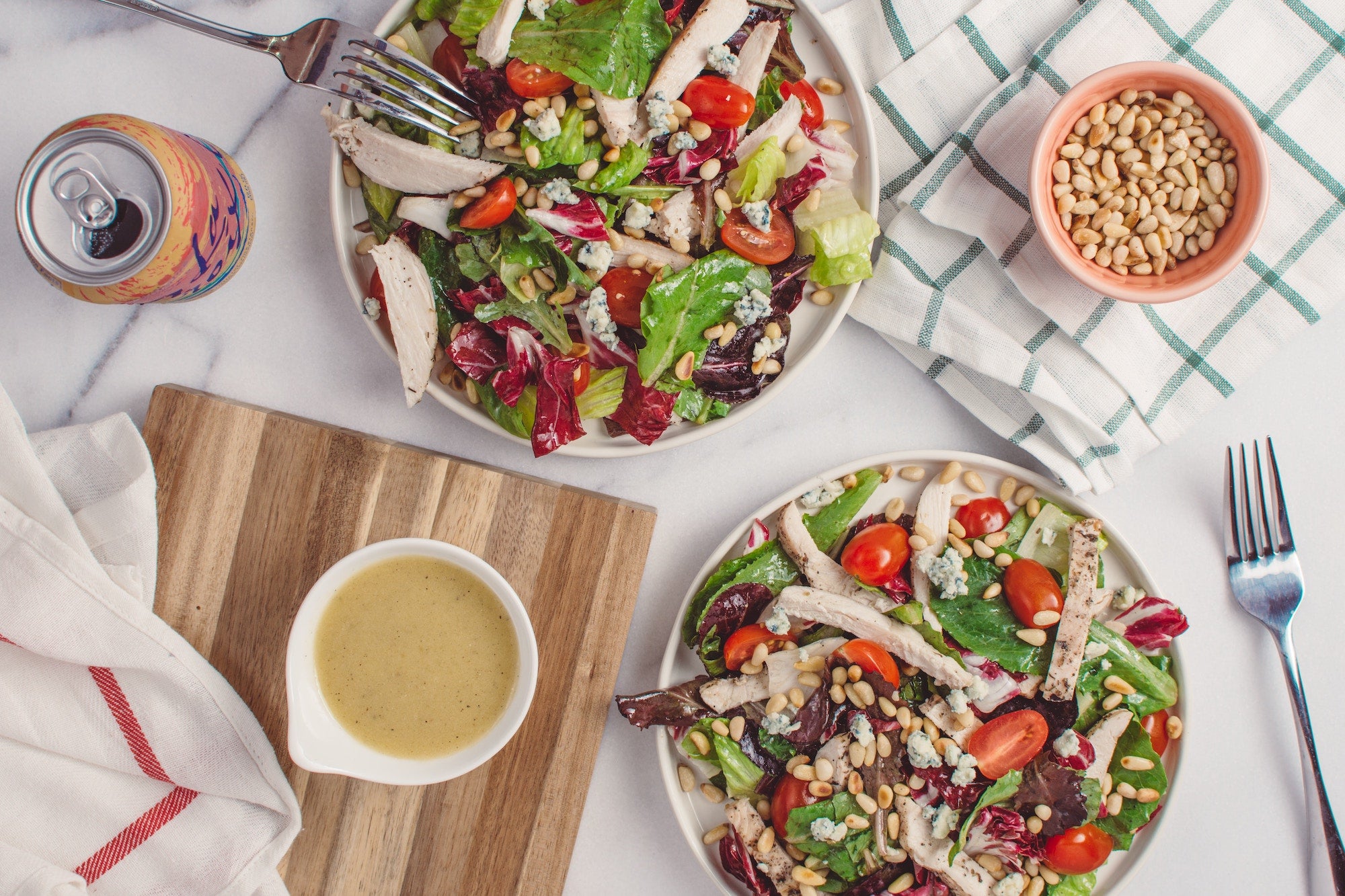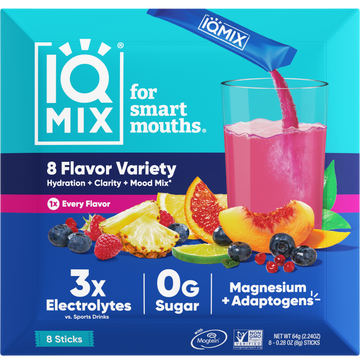Could the key to weight loss be hiding in that chicken breast in your fridge, the can of beans in your cupboard, or the IQBAR stashed in your bag? That’s right, we’re talking about protein. This essential macronutrient isn’t just for bodybuilders—it’s also a vital weight loss tool.
So, what’s the connection between protein and weight loss? And how can you pack more protein into your diet? That’s what we’ll be covering today. Here’s what you need to know!
What Is Protein and Why Is It Important?
Protein is a macronutrient that’s essential for the normal functioning and growth of the human body. It’s made up of small molecules known as amino acids, which are often referred to as the “building blocks” of life. There are twenty different amino acids, nine of which are considered “essential,” meaning our body cannot make them and we must get them from the food we eat.
Protein serves a multitude of roles in our bodies:
- Growth and Repair: Protein is a crucial component of every cell in the human body. It’s vital for bodily growth and repair, particularly during periods of development like childhood or pregnancy, or during healing from wounds or surgeries.[*]
- Muscle Development and Maintenance: Proteins are vital for muscle maintenance, repair, and growth. When we exercise, particularly during resistance and strength training, our muscles undergo small amounts of damage. Proteins help repair this damage, enabling the muscles to grow stronger and larger. Furthermore, adequate protein intake is crucial to prevent muscle loss during weight loss or as part of aging, ensuring that the body remains strong and functional.[*]
- Enzymes and Hormones: Many enzymes and hormones, which carry out a vast array of biological functions, are proteins. For instance, enzymes facilitate biochemical reactions in the body, while hormones like insulin (a protein) regulate blood sugar.[*]
- Immune Function: Antibodies, a type of protein, play a critical role in our immune response, helping to fight off infections by binding to foreign particles such as bacteria and viruses.[*]
- Energy Source: When other sources of energy (like carbohydrates and fats) are low, the body can use protein as a backup energy source.
- Structural Role: Proteins like collagen provide structural support in connective tissues, skin, and bones.[*][*][*]
The Protein and Weight Loss Connection
But wait, there's more! In addition to the functions above, this mighty macronutrient plays an important role in weight management and loss. Here’s how:
#1: Satiety and Appetite Control
Protein is known to increase feelings of fullness, more so than carbohydrates or fats.[*] This is partly because protein reduces levels of ghrelin, the “hunger hormone,” and boosts levels of peptide YY, a hormone that makes you feel full.[*][*][*] As a result, you’re less likely to feel hungry between meals, leading to reduced calorie intake and instances of overeating.
#2: Increased Energy Expenditure for Digestion
The process of digesting, absorbing, and metabolizing nutrients requires calories. This is known as the thermic effect of food (TEF) and it’s highest for protein.[*] That means your body uses more energy (burns more calories) to process protein than fats and carbohydrates. This can contribute to a calorie deficit, which is needed for weight loss.
#3: Higher Metabolic Rate
As discussed earlier, protein is vital for muscle maintenance and growth. And higher muscle mass is associated with a higher metabolic rate, which means you burn more calories even when resting.[*] This is particularly important during weight loss, as it can prevent the loss of muscle mass often associated with dieting.
#4: Reduced Cravings
Some evidence suggests that protein can reduce cravings and the desire for late-night snacking. One study found that increasing protein intake from 15% to 25% of total calories decreased cravings by 60% and reduced the desire for late-night snacking by half![*]
How Much Protein Should You Consume Daily?
The recommended dietary allowance (RDA), which serves as a guideline for the minimum amount of protein necessary to prevent deficiency, is 0.8 grams per kilogram of body weight per day for healthy adults.
However, a growing body of research indicates that protein intake well above the current RDA may be beneficial for appetite regulation, weight management, and athletic goals like building muscle and improving performance. If you’re an active person or are looking to lose body fat and/or gain muscle, a daily intake of 1.2–2 grams of protein per kilogram of body weight a day may be more appropriate.[*]
While high-protein diets are generally safe for healthy individuals, anyone with specific medical conditions, such as kidney disease, should consult with a healthcare provider before making substantial changes to their protein intake.
How to Increase Your Protein Intake
Ready to give your diet a protein-packed punch? Here are some practical ways to add more protein to your diet.
- Stock up on good protein sources: Keep your fridge and pantry stocked with high-protein foods. Good options include lean meats, fish, legumes, unsweetened yogurt (especially Greek yogurt), whole grains, cheese, eggs, nuts, and seeds.
- Include protein at every meal: To ensure you get enough protein each day, make it a habit to include a protein source at each meal. Whether it’s eggs for breakfast, lentils in your lunchtime salad, or grilled chicken for dinner, consistent protein can help keep hunger at bay and support your health and weight loss goals.
- Whip up a protein shake: A quick and easy way to get more protein is to make a protein-packed smoothie. Add your favorite fruit, a scoop of protein powder, a high-protein yogurt like Greek yogurt, and almond milk. Be sure to choose a low-sugar, clean protein powder without artificial ingredients. Whey protein and plant-based protein powders are both good options depending on your nutritional preferences.
- Make your salads protein rich: Salads don’t have to be just vegetables. Add a serving of lean chicken, fish, tofu, or chickpeas to up the protein content.
- Make smart swaps: Swap starchy foods with protein-packed alternatives. For instance, trade your usual rice side with quinoa or replace white pasta with lentil pasta.
- Snack wisely: Trade in empty-calorie snacks for protein-rich alternatives. Nuts, cheese cubes, celery with peanut butter, or a protein bar like IQBAR can keep you satisfied between meals while adding a protein boost.
Each vegan and keto-friendly IQBAR contains 12 grams of plant-based protein from pea protein and only 2-3 grams of net carbs—perfect for those following a low-carb diet plan. Choose from delicious flavors like Toasted Coconut Chip, Lemon Blueberry, Banana Nut, Matcha Chai, and more!
A Final Word on Protein and Weight Loss
Higher protein intake is associated with increased fat loss, muscle growth and maintenance, and other important health benefits. And remember, adding more protein-rich foods to your daily menu doesn’t have to be as bland as boiled chicken. With a little creativity, a dash of intention, and a stash of IQBARs, you’ll be living that high-protein life in no time and reaping the rewards!
Written by Katie Koschalk, a health and wellness writer, certified holistic nutritionist, and certified personal trainer based in California.




